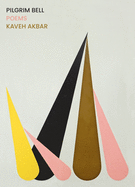
Pilgrim Bell, the second poetry collection by Kaveh Akbar (Calling a Wolf a Wolf), is a playful and profound meditation on life as a Muslim American.
Scriptural themes and echoes abound here. Prose poem "The Miracle" is about Muhammad the Prophet, an illiterate man who nevertheless read God's words at an angel's command. Akbar ponders the fears and addictions that hold people back from assenting to revelation. The multi-part title piece probes identity, forgiveness and vulnerability. Its short, punctuated phrases suggest timid determination: "All day I hammer the distance./ Between earth and me./ Into faith." Yet cynical skepticism is never far behind; "Ask me again/ about my doubt--turquoise/ today and almond-hard," he invites in the later poem "There Is No Such Thing as an Accident of the Spirit."
Farsi is a recurring point of reference, and "There Are 7,000 Living Languages" and other poems attest to the relativity and sensuality of language. The final entry, "The Palace," presents the USA as a land of opportunity--but with costs. Akbar's father left Iran not knowing if he'd ever see his siblings again. How was this immigrant family to feel at home when some Americans casually joke about bombing the poet's birthplace of Tehran?
Food, plants, animals and the body supply the book's imagery. Wordplay and startling juxtapositions ("my turn-ons/ include Rumi and fake leather") lend lightness to a wistful, intimate collection of 35 poems that seek belonging and belief. Readers should get a mirror out to read "In the Language of Mammon"--it's printed backwards--but keep it at hand for reflecting on their own challenges of faith and family. --Rebecca Foster, freelance reviewer, proofreader and blogger at Bookish Beck

